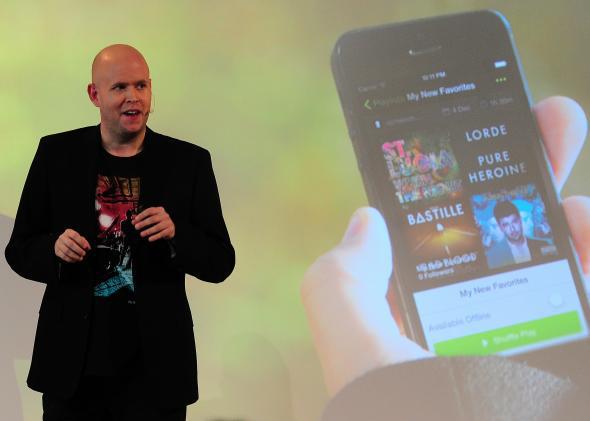When Spotify came to the United States in 2011, it seemed almost too good to be real—a music service that would let you listen to almost any song, by almost any mainstream artist, for free, whenever you wanted to. “Spotify is what iTunes would be like if Apple decided to give everything away for free,” Farhad Manjoo raved. The only catches were that you had to listen to annoying ads every few tracks, and you could only listen up to 10 hours per month after the free trial. That second catch has since been waived for U.S. listeners. (There may be other downsides for artists, whose royalty fees from Spotify are notoriously miserly, but that’s not the average listener’s concern.)
Over the years Spotify has continued to be a fantastic service on your desktop computer. Its problem is that people often want to listen to music when they’re not at their computer. Spotify’s free mobile service has been feeble at best. Instead of allowing you to listen to whatever you choose, you’d get “Spotify Radio,” a computer-selected playlist full of songs that sound like the artist and song you actually wanted to listen to. That’s at least partly because music publishers tend to demand greater compensation for “on-demand” streaming. Pandora has been doing the same thing for years, and doing it well. No wonder a lot of people have opted to stick with Pandora on their phones and tablets, giving it a big lead in the mobile market.
Today, Spotify had some bad news for its rivals—and good news for people who like free music.
- First, it will now treat tablet users the same way it treats desktop users, giving them free on-demand access to the full catalog.
- Second, users on mobile phones still won’t get on-demand streaming of specific songs, but they’ll get something a lot closer to it.
Now, instead of just a radio station, smartphone users will get what Spotify calls “shuffle.” Choose your artist—Jay Z, let’s say—and you’ll get a randomized playlist of songs by Jay Z, not just songs by performers who bear some algorithmic resemblance to Jay Z. Even better, mobile users will be able to listen to their own Spotify playlists on shuffle. They’ll also be able to add to those playlists and even make new ones while on the go.
This is still a big step short of full on-demand streaming. Try to cheat the system—by, for instance, making a playlist that consists of just the one song you want to hear—and Spotify will thwart you by throwing in “suggested tracks” by different artists. D’oh!
At the same time, though, it represents a significant leap beyond what Spotify, Pandora, iTunes Radio, and others have offered up to this point. Those who use Spotify on the desktop now have a huge incentive to download the app, because it will give them access to the playlists they’ve so carefully curated over the years. And while not being able to choose a specific song is less than optimal, a lot of people like to hit “shuffle” anyway when they’re listening to music on their phones, rather than having to go through and hand-select each album or track.
The only real objection I see here is that, by improving its free product, Spotify will deter people from actually ponying up for its premium service. (About one-quarter of its 24 million users today are paying subscribers.) I raised that point to Charlie Hellman, Spotify’s vice president of product. He said Spotify has been hearing a version of that argument ever since it began—the argument that the more you give people for free, the less they’ll be willing to pay. Actually, Hellman told me, “We’ve seen the exact opposite—that the more we give away for free, the more people are willing to pay.”
The counterintuitive logic is that, as people use Spotify’s free service, they invest time and energy in making playlists, following friends and artists, and other activities that make Spotify more valuable to them. Meanwhile, of course, they’re developing the habit of turning to Spotify rather than its competitors whenever they want to put some music on. I also have a hunch that, over time, those loud, intrusive Spotify ads go from mildly annoying to flat-out haunting your dreams.
But even if this proves a money-losing move for Spotify in the long run, it’s still bad news for iTunes Radio and Pandora in the short run. They now have to either follow suit or risk losing mobile users who want something more than computer-generated radio on their headphones.
Oh, by the way, Spotify also announced today that it’s adding Led Zeppelin to its catalog.
Previously in Slate:
